|
by Rachael Crosbie. In "Sestina", the waltz of the stanzas lures you in similarly like The Haunting of Bly Manor—you’re in for a gothic piece dipped in romance. Also, there’s a lake involved. While violent, the poem is beautifully written, and its sestina form pushes the narrative forward better than any other poetic form. “Tonight my car’s headlights will beam the lake / cuing that waltz which lulls me back to Luke.” This immersive recount of a lost love pushes and pulls you throughout the poem, a natural ebb and flow, the dichotomy of life and death. Like the water in the lake, there is a certain stillness between the waves, a moment in the waltz, where that gap between life and death comes through.
0 Comments
by Tahlia McKinnon. (photography by Hoss) With every wounding word poised to mark the skin, hit the throat, wind the lungs—like a bodily trauma, McCaela Prentice delivers blinding impact in just a few short phrases. There’s a delirium to the poem—a needing to make sense of things. A quiet unravelling. When we consider the titular word, Equinox, in this way, there’s an unpronounced prickle of melancholia, an undeniable ache of nostalgia – but not for what has come to pass in this protagonist’s life. For what was lost. For what was stolen. For what could and should have been. Shrouded in dark metaphors and allusions, the reader can only surmise, of course. But closing with a nod to winter—a season synonymous with death and decay, introversion and introspection—it’s as if the speaker is sharing a dark secret; making a confession; crying for help. A cry that can only echo through your bones, with each and every haunting line. Exquisite. by S. Preston Duncan. As cliche as the notion of channeling Shakespeare may be, I do believe in poetic channeling. I'm talking about writing you can feel, with distinctive contours. With ancient, living skin. Writing that leaves you silently self-narrating in its voice while you lean over the dishes hours after reading it. Writing that resonates in the primal drums that keep the rhythm of human history. "Speech from the Ur-Hamlet" by Lucy Frost is a spell cast in consonance and percussion, thick and dizzy as any southern summer. Astonished, almost, to be in its own presence. And this is what makes it relevant as more than an academic curiosity - its timelessly human character. Its capacity to merge with canon and still stand on its own. Its ability to take up residence within a reader, and assume a long forgotten throne in the back of their mind.
by Ruairi White. Ashley Cline’s "mercy! mercy! (how we survived the winter)" is a poem about letting go. In three stanzas, Cline takes us through a break-up that’s as gentle as it is devastating, juxtaposing tenderness and violent imagery to mirror the emotions of a relationship at breaking point. Dying moths and swarming mosquitoes bring a sense of claustrophobia to a sunny afternoon outdoors that perfectly conveys the dread and heartbreak of having that conversation. The poem opens with two song lyrics which sum up the two parties in the relationship: the first is the chorus from Robyn’s "Call Your Girlfriend", a break-up song about doing the right thing by ending a relationship; the second is a shorter quote, from Cher’s "Bang Bang" - "My baby shot me down". The disconnect between these two lyrics—one communicating a bittersweet sense of duty, the other blunt heartbreak and betrayal—sets us up for the core conflict of the poem before it has even begun—"mercy! mercy!" isn’t just about the pain of not being ready to move on, it’s about the pain of knowing your partner already has. Cline refers to the break-up as a "mercy killing", and this notion of mercy as a well-meaning but destructive act is the foundation of the poem. To the speaker, mercy would be allowing them to love in peace; their partner’s good intentions mean little to them when they’re suffering such a heartbreaking and bitterly one-sided loss. This comes through in every little detail of Cline’s writing, from the description of the girlfriend as an "opponent" as she holds the speaker’s hands, to the comparison of her supposed mercy to moths burning in flames. The poem ends with a much shorter third stanza, which drives the emotion home in a blunt final line. When it comes to raw vulnerability, "mercy! mercy!" pulls no punches. by Ashley Cline. CW: postpartum depression What does it mean to be haunted; to be made to disappear—into a new life, a new home, a new anything at all, really—like magic? "And what you see here is an ordinary brown moving box. When you put all your clothes and dishes and photos and vases and toothbrushes and toys inside, poof!, nothing changes. Ah, but look again. Everything changes. You are no longer here. And you are no longer you.” In “A Nursery Tale,” Emily delaCruz considers the ways in which we find ourselves as ghosts, whether of ourselves, our own minds or, perhaps, something more sinister still: “…I felt fine. My brain cogs may have been slipping, but they slipped so gradually that I barely even noticed…the thing about slipping into postpartum depression is that it is very slow, very gentle.” Gripping, in both narrative and its lush, haunting imagery—from the towering pine trees our narrator hates and the stream that runs beneath them like “a black crack in the clean woods,” to the small gravestones covered in “a handful of snow, like wedding white roses”—“A Nursery Tale” doesn’t hide its teeth, but rather, delights in showing the reader its slow, deliberate smile. Sometimes the best ghost stories haven’t any ghosts at all. by Carson Sandell.
“menagerie II” by Arielle Tipa is a short, yet gutting piece. In the space of six lines, they paint a picture of a grim menagerie. The poem depicts screaming and dying animals kept in containment. At first glance, the piece is nothing more than that—however, reevaluating the lines, you may discover another layer. What if the animals were humans, and the menagerie us, being contained by our government and other oppressive systems? This is a mesmerizing piece for its careful use of language and commentary on current events. A poem so delicately crafted, it should be studied. “orchis italica” is another poem Arielle Tipa knocked out of the park. This piece captures a feeling we've all experienced at some point in our lives. The speaker wants to shrink into nothing, but still yearns to feel the lips of a lost lover one more time. This poem is clever with its title. Orchis Italica, or commonly known as the Naked Man flower, is supposed to produce virility in people, yet the speaker feels powerless. There are a lot of levels operating with this poem. And even without breaking all of it down, the emotions it elicits are always worth the read. In “silk moth”, the speaker anthropomorphizes themselves as a moth, a pest the receiver of the poem was warned about. The speaker says they have “tapped the lightbulbs without forgiveness” which suggests they are unapologetic for the fact they have seen a brighter future. To me, this poem encompasses a relationship gone sour, but the speaker knows that they are all the receiver of the poem has. Even saying, “eat me and there will be nothing left.” The speaker stays out of sympathy or some wicked reason, even though they’ve seen how amazing escaping the situation would be. This poem can be read as a lover staying with someone they fell out of love with, or it can be read as a lover, the receiver was warned about, finally coming to terms with who they dated. Either way, this poem is mind-blowing, beautiful, and leaves a lot of room for interpretation. by Elizabeth Joy Levinson. (art pictured by Sara Blaske) “The Bicycle Rack at the Beach” by Lynn Finger is a poem of unlikely juxtapositions that take the reader into an underwater dream built around deft language and stealthy turns. It begins simply enough, the human relic of a wayward bicycle rack that ends up underwater, the “ribs” of which become a home for seahorses. We know how a shipwreck can become an underwater city, but a bicycle rack is something far less tragic and for that, almost more compelling as a ship was never so mundane; the transformation of the bike rack that much more magical. And "the petal shavings from the moonlight" reveal more than they should; the narrator herself stitched to something as fluid, as elusive as the glassy ripples. This is the nature of all relationships, isn't it? As difficult for us to understand from within as they are to understand from those outside of the relationship. This is a poem I will return to again and again, as each reading reveals something new, a surprise of language or a surprise in the self. by Emily delaCruz. Cantillo’s "Origin Song" sings the tenderness and fear of pregnancy. The pinto bean in her mother’s fleshy pit doesn’t see the world, instead she experiences it through the music of her mother’s life: green beans snapping, a broom grating, the soft cluck of hens. But when the poem turns on the soft thud of a rotten mango, hidden fears are revealed in a lawnmower choking and the syrupy singing of a drunk man. The triumph of this poem unfolds in its final lines where we meet the mother locked in prayer that transfers to her daughter. Cantillo’s subtle intertwining of hope and fear against the musical backdrop of life is masterful in "Origin Song". This is a poem that lulls then bites, leaving an echo. by McCaela Prentice. I didn’t have any idea what soursop was before I read this poem—but how fitting. To compare a heart’s burst to a fruit just as overbearing. I read this just as the weather was warming up in New York, and it reminded me how spring can make love out of anything. And how that can make a fool out of anyone. We get those first cherry blossoms in April and everyone starts dreaming up new ways to be desired. All seasons are for longing, but spring is the best one. This piece shows so much need, and it does so much with so little space. It’s all unfurling. I think it really does capture the heat of a fling, or of something we get very dizzy hoping will become that. It wasn’t until the end that I felt this poem was less about the kiss and more about the pulling away from one. It feels to be about the vulnerability required in any offer of intimacy (and that bravery then feeling foolish). All that longing “For the doorbell, for the parcel, The kiss” is as memorable as it is tangible. ‘Marcel’ is “married with children”—is unable to fulfill the incessant longing that is so beautifully depicted in this piece. I had to read it a few times over to really understand the gravity of it. It breaks your heart so quietly. by Tucker Lieberman. (art pictured by 婕 Venus Cohen) In the poem “Hollow Point,” Kris Hiles gently interrogates a transition through the sensory qualities of the moment. Though we are spared the details of whatever trauma has called for someone to “rearrange my skeleton,” the words nevertheless carry a raw emotional quality. We seem caught in a freeze-frame. “A splash in the tub” captures a brief occurrence, while “the flattening of a bullet, / just a little bit” suggests how a bullet may be deformed slightly by what it hits, likewise suggesting the instant of impact. Yet time does not move on. There is “the great slowing” and the observation that “the sapling is / the tallest tree,” perhaps meaning that there has not been, or will never be, enough time for the young trees to grow up. Life vanishes. We have “smoke,” “evaporation,” and “enough thirst to / drink the whole river”. We are left with “echoes”. With quiet mood and direct words, "Hollow Point" is a good example of how a poem can draw a reader into the poet's world to explore a sensitive and potentially scary subject. Insofar as this may be a meditation upon death, it could represent the closing, rather than the opening, of possibilities. But you may find something different in it. Each of us is, after all, “waiting for a tarot reading.” by Keshe Chow. This is a piece that creeps up on you. On its surface, it’s a sultry, seductive piece, with the seedy undertones of a cheap motel. It takes you on a journey; from the darkness of death in the first sentence through testaments to both religion and sex, Marlo Collins doesn’t lead you through this poem by the hand. She yanks you through the stanzas with the loosened belt of a bathrobe, strokes your hair, tells you everything will be okay, then stick a sly knife in your gut. The piece sways between pain and hope, hope and pain, then ends on pain. And toward the end, one gets the sense of someone who aches, who feels empty and rejected. Collins makes you feel like the protagonist, “with empty pockets and holes filled”. That is, until the last line, when the fourth wall is broken, and you can’t tell who is who anymore. Powerful stuff, and so deftly done. by Dale Stromberg. (CW: death) Poets sometimes draw emotion from us by evoking sensations in the way of music or painting, with their words’ connexion to analytical sense left purposely tenuous. Likewise, the story underlying Shyla Jones’s “Jellyfish” is metaphorised into imagery and voice, and this narrative voice becomes its most lucid element. Who this narrator is, we cannot say; but, if we are who we are through other people, then she is who she is, at least within this piece, through her mother—the only other character identified, whom the narrator grimly apostrophises, and who allows the narrator no other physical or social contact. Within this enforced dyad seethes that original filial promise, and menace, to outlive the parent. The mood of the prose is of monstrosity, of animals born and slaughtered, of dampness and the tomb, as the narrator, in chilling assuredness, wends towards her mother’s end. How parent may have earned such animus of child is left to the reader’s intuition. The prose expresses the mother/child relation in terms of iteration: the mother’s birth, the deaths of the mother’s parents, and the mother’s own fate—to become, in the story’s final condemnation, “parent rock”, a buried substratum producing new soil. Iteration is also intrinsic to the piece’s central metaphor: a biologically immortal jellyfish that returns continually and perpetually to its polyp state. Child to mother to child again: there is a promise of cyclicality in this, though the narrator warns her mother, as this cyclicality looms, “don’t scream.” Earlier, we are told the mother, as a baby, “had hair like silkworm cocoons, stringy and pale”, and this hair, I speculate, was the tentacles of the mother when still a polyp, before she metamorphosed into an adult jellyfish—a medusa. by Lynn Finger. (CW: sexual scenario, religious trauma) In “Red Hairband,” Kaitlyn Crow takes us into the world of the senses that play out between two lovers inside their parked car. Crow is beautifully visual in the description of this intimate moment. For example, we are shown, “muscles wrapped around a lean backseat lover, torn dress, discarded seat belt buckle burning lines into spine.” Personal details are revealed by Crow, such as the red headband, church bulletin and condom wrappers, and we are immersed in the physical surroundings of the communion between these two. Crow shows us that sex and religious feeling have much in common: the awakening of the senses, the sense of surrender, the exploration of the other, and calling out the beloved’s name: “...they pledged their virginities and begged for Him to save their souls with hushed prayers and pursed lips, and she’s repeating that prayer now, lips miles apart…she screams save me save me save me.” The passion of the lovers erases the lines where the body ends, but also intensifies what the body knows. The plunge into this sensual catharsis is told in two sentences, as if Crow were showing the breathlessness of the lovers they portray. Crow illustrates that becoming lost in this union is a sacred moment, and both transcends and is created by the details of this communion—the red headband, the freckles, and sweat. by Jared Povanda. (art pictured by Shawn Ferrari) (CW: death, grief) Cecilia Kennedy’s “Between the Scalloped Edges” is a story that revels in mystery. At first, the prose is intentionally vague and mired—as if plunging the reader into fog. In the first paragraph, the narrator says, “Something tells me to look up. I can’t quite place what that something is, but it’s one of those nagging feelings that grows into worry. Somehow, I’m forgetting something important. Sometimes, I think that if I reach up high enough, and in-between the curved edges, I’ll find a head or a face or something I’m not expecting.” Something, something, somehow, something, sometimes, something. The repetition is a purposeful device utilized to unsettle. To leave the reader off-kilter and unmoored. The main character doesn’t know what they’re looking for at the top of the kitchen cabinets or what they’re going to find, and the immediate tension for the reader is both wonderfully compelling and deliciously strange. As the piece moves, Kennedy weaves between the past and present to both paint a picture of minimum wage malaise and a deeper, shrouded grief. Something hidden. In a story full of stunning turns of phrase, my favorite detail has to be this one: “Sometimes, I make the mistake of throwing away an empty plate from a table, only to find out that the plate was not empty.” At some point, she remembers the food. She remembers the fullness of the plate, the exact opposite of emptiness, and that idea of memories almost sprouting like mushrooms continues on as the story unspools. Remembering—what the characters remember (a grandmother’s water pie, for example), don’t remember, don’t want to remember, find painful or impossible to remember—is this running theme throughout, and as the main character remembers her sister, the reader is again swamped in unsettling repetitious imagery. This time, Kennedy uses glass to unnerve the reader. To create an almost kaleidoscopic environment to keep the reader guessing about the truth of what happened to this family. As glass reflects and refracts the light, Kennedy expertly plays with the reader’s expectations of plot and language. What is, at least initially, a piece that is focused on a very human tension seems to veer into the spookily vague. The preternatural. “I find pieces in my hair,” the main character states, and then, “The manager at work has to pull me aside one day to talk to me about how guests have complained—how they’ve seen me picking pieces of glass from my scalp.” The past is merging with the present in unprecedented ways, or maybe what’s past has never finished haunting the main character. She says soon after, in a sort of dream or memory, “I work well into the night, gathering the pieces and finding where the edges meet…I look through them as if they were a complete window…I look through, and I’m seven and she’s five.” I almost want to ask whether or not the sister is a ghost—but I also know that’s how the family in the story has been treating this unnamed sister. Kennedy is exceedingly clever in how she doles out information, and in a bounding, reflective writing style—nearly ponging the reader back and forth—she has made me, in such a short space, want to theorize about What Really Happened Here. And is it better not to remember what actually happened? Is it better to forget? What about the glass? Is it some sort of haunted penance? There’s also the lovely detail about the main character working in hospitality when so much of what is described here is the opposite of hospitable. And I have to point out how the final lines linger and echo back through the story. How sleeping and waking are intertwined with the theme of remembering. How pain can paradoxically cause one to come to awareness (“I heard my name in hushed whispers—and something hurt—my hand, I think.”) while also causing a sort of emotional recession. A plunging once more into the fog (“They cared for me; they took me by the hand, but they never looked at me again. Looking is remembering.”). The final line especially speaks to the main character acknowledging the need for sleeping after a long day of playing. It is also true, though, that the sisters’ playing is interrupted by shards of glass coming away—falling away—as something sharp and awful will always come between them in both life and death, memory and dream, past and present. I so admire and respect what Cecilia Kennedy has accomplished here. “Between the Scalloped Edges” is a story of grief and murder, of multiple forms of loss, but it is also a story of sisterhood and what endures. There is pain and there is beauty, and it is the constant bouncing between these two poles that makes this story such a successful piece of art; readers won’t be able to help pondering over the fates of the characters long after they’ve finished reading. by Lucy Frost. (CW: discussion of sexual assault) In “Apple Lover” and “Some Boys Terrify Marine Creature (6),” two exuberant and elegant rhapsodies of survival, Becki Hawkes achieves a voice of lyric suppleness and epic durability, surveying the details of pain and the pitch of transcendence in a grand, fluid tonality whose precise modulation figures the shape and color and texture of experience. Her phrasing, sinewy with surprise and wit, laced with pressure points, shaped by the tensions of understanding gained in time, arrests the eye with sharp delineations and an awareness of meaning’s keen underlying edges—“some boys, / any boys,” the deceptively laconic parenthetical that haunts “Some Boys Terrify Marine Creature (6)” with its antagonist, is a vital moment to the art, scaffolding the eloquent balance of her perspective; definite but abstract, not an inch closer to or farther from us than it needs to be. The shading of generals and particulars, of “any” and “some,” signals the versatility of Hawkes’s poetic control. Likewise the shifting parameters of “Apple Lover,” whose festive botanical-entomological census—a whirl of lavish organic observation, crowned with “five Red Admirals, wings as vivid as hearts” amid feasts of “Braeburn, Jazz, / Granny Smith” (the omission of “and” before “Granny Smith” suggesting further bounties beyond the limits of enumeration)—spiral about the nervous understanding of trauma, the anxiety of regeneration. When that anxiety becomes explicit in “Apple Lover,” Hawkes’s control takes on a stark splendor and urgency. A fluid syntactical architecture brings us from butterflies drinking from a “fallen Bramley” to the pointedness of “I dreamed I could feast too / because it’s been years / since it happened, and I don’t talk about it much.” The transformation in register is total yet necessary, natural as a change in tides, natural as an earthquake’s sharp interruptive significance, painful because pain and the active engagement with pain are the substance of these two poems’ internal music. The structural trajectory of “Apple Lover,” from sumptuous idyll to a recollection of sexual assault and its aftermath, speaks most fluently to Hawkes’s achievement when, in the poem’s subsequent return to the pastoral ecstasies of its opening, the language enacts a complex liberation for and by and through the speaker—we return to a nature poem, but with richer accents and deeper perception than at the start, because with a renewed understanding of natural significance—a growth of selfhood that at once includes beauty and reckons with sorrow. “Apple Lover” becomes the luminous, gushing song of “all of me poured into yes,” a gorgeous Whitmanian affirmation of selfhood. This procedure takes on sharper edges in “Some Boys Terrify Marine Creature (6),” whose idiosyncratic extended metaphor begins uses a crossword puzzle clue (as explained by an author’s note) for a tremulous essay on cruelty and resilience. Just as “Apple Lover” never resorted to merely “motivational” rhetoric, “Some Boys Terrify Marine Creature (6)” is wholly free of triteness—its injunction to “neatly behead / the boys, cut the terror in two” is a wonderfully refreshing alternative to easy platitudes about forgiving and forgetting, sharpened by the dialectic energy Hawkes summons here, the vivid contrasts between the cruel “boys” who have “made a circle” around and “are laughing” at the target of their viciousness—a scene painfully familiar to so many of us– and the “marine creature” who rather thrillingly wins the day. The analogy is straightforward but versatile, incorporating the ineffectual “ocean,” whose “quiet song, not loud enough / to drown the high flayed pain that tastes like salt” stands with bitter accuracy for all bystanders to the world’s ugliness—and, with masterly strokes of pathos and perspective, incorporating also a second-person narrator whose interpretive drive elevates the bare fact of the marine creature’s struggle into a living symbol, an account of just how and why “there are always / routes out, / always more meanings than you think.” by Becki Hawkes. There is so much to relish in Carson Sandell’s work: these are poems rooted in both the natural and the supernatural, delicately sensual, designed to suck a reader in, bind them with sharp, vivid imagery—and put them firmly on edge. I loved the opening to “Poltergeist”: the way its evocation of longing and romance—“I sense your honeysuckle heart”—turns to violence in the line that immediately follows: “is ripped like ghosts from graves”. It’s both beautiful, and deeply unsettling—as is the poem itself, which combines the direct, lover-like address of its speaker (“I, your desperate poltergeist”) and their intense desire for recognition with an effectively eerie final image (“…lips and fingers extract ectoplasm”). Even when reading in your own head, you instinctively read it in a hushed, desperate whisper. “Crystal Carapace”, too, is a poem that comes alive when read (or whispered) aloud: the alliterative loveliness of the title —a phrase you just want to say again and again—is echoed by similarly satisfying lines throughout the poem, such as: “Fast forward to fall/And I’m fully flavoured”. As with “Poltergeist”, however, it’s the horror and strangeness that ultimately stay with you, alongside the considerable beauty. The poem pulls us through the seasons, images of death and lost Paradise lurking underneath the fecundity—summer is a time to “sprout, but autumn sees apple flesh grow “Crisp enough for Adam/sweet enough for worms”. The final lines, in particular are just haunting: As I’m immersed in ice My craved contents rot My sought-after blood Blends in with pale dirt And I linger as a crystal carapace The poem made me think of the pictures of icy “ghost apples” I’ve seen online—but while the usual reaction is to these images is one of wonder and curiosity, Carson’s work reminds us that, while the natural is often heartbreakingly beautiful, it is never safe. These poems, so alluringly lovely on first read, bring us back to our own mortality, and our own irresistible desire to “linger”. Grim stuff— gorgeously done. |

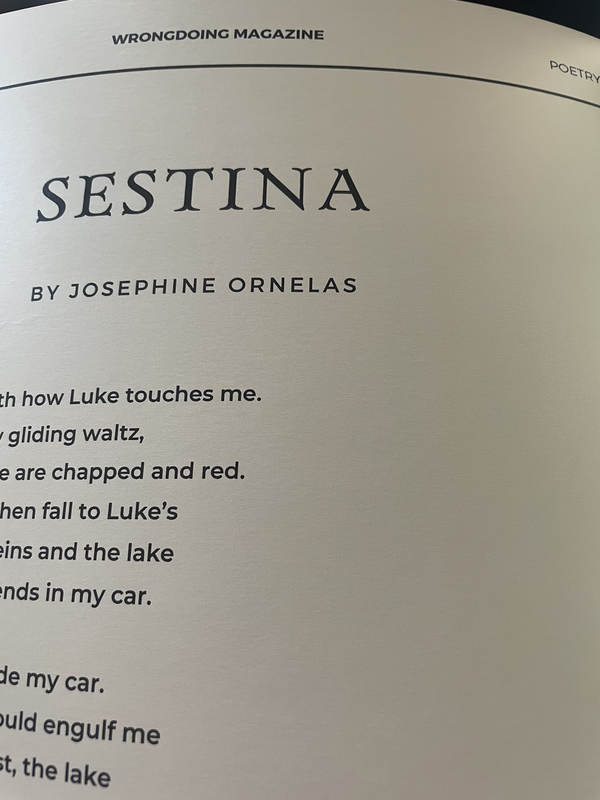
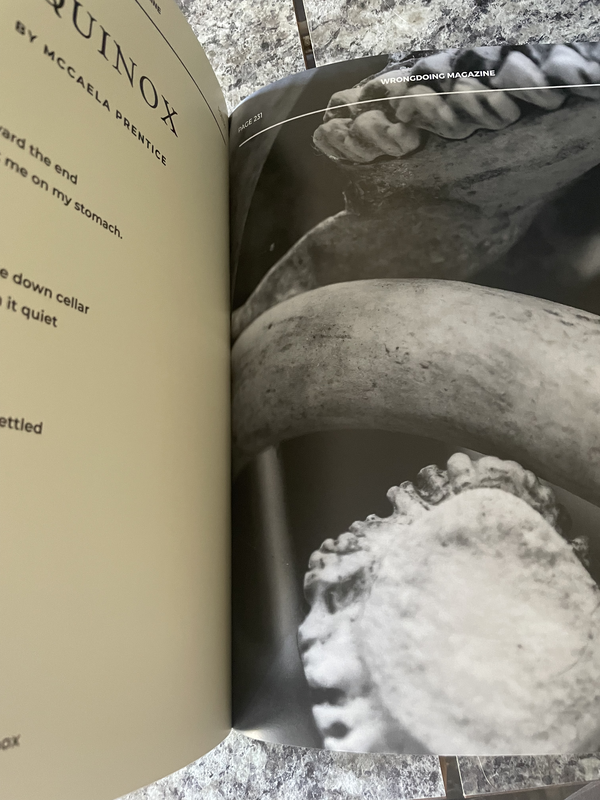
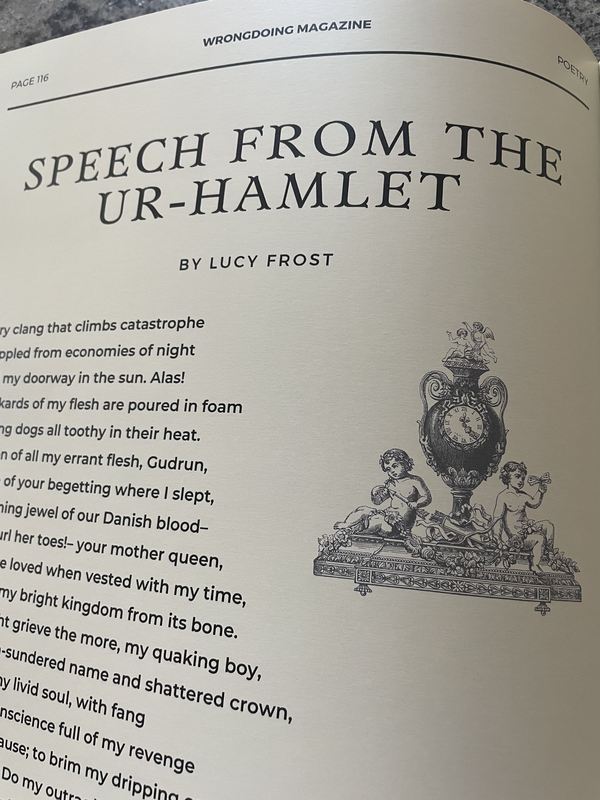
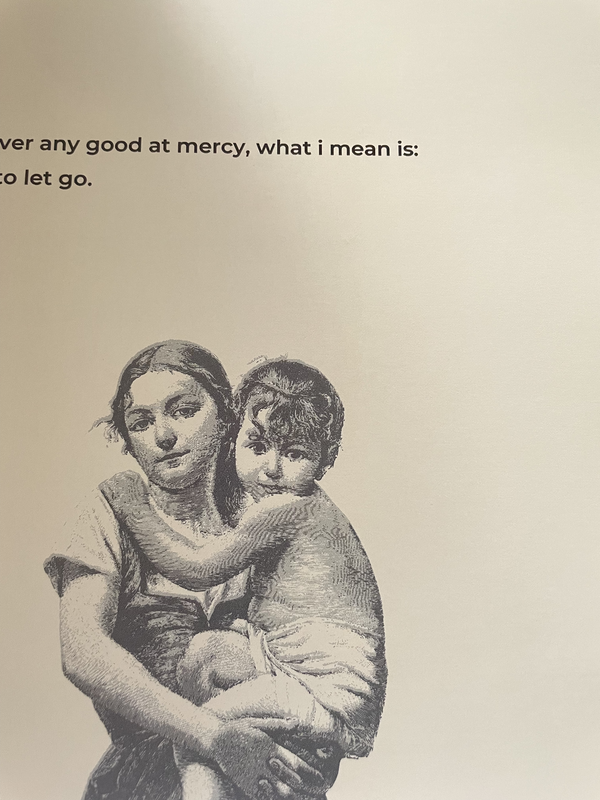
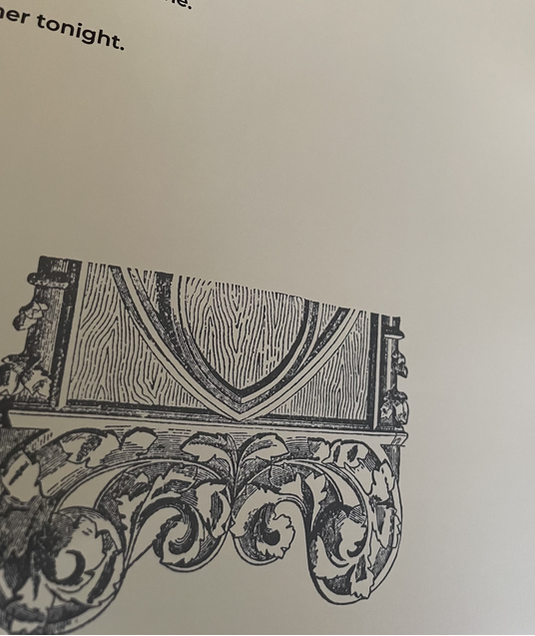
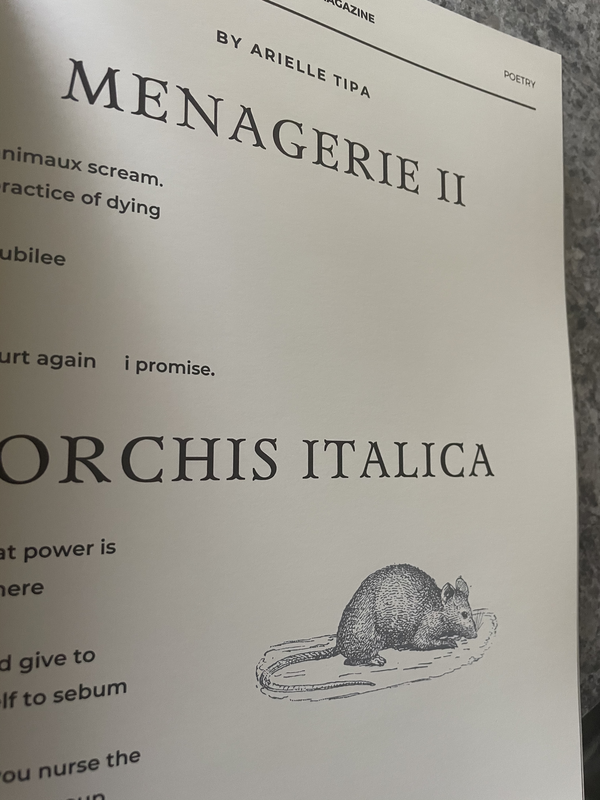
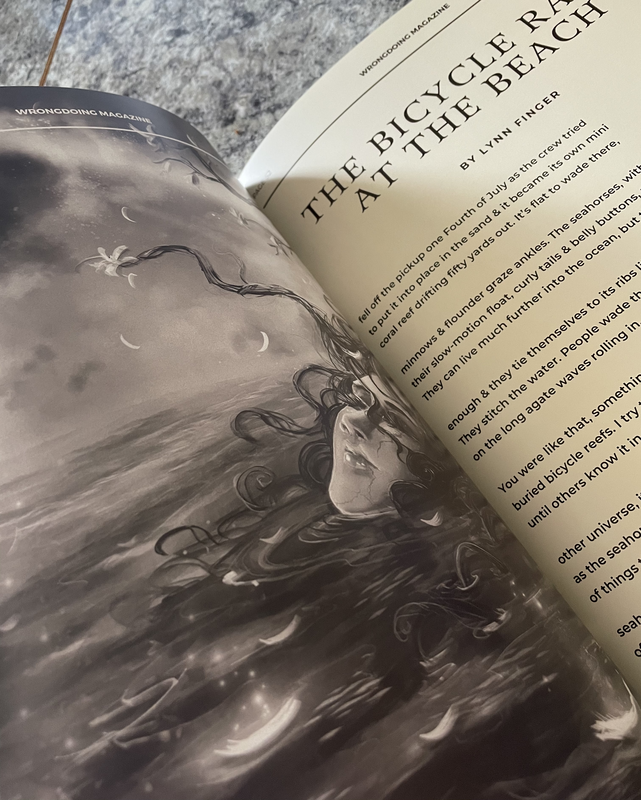
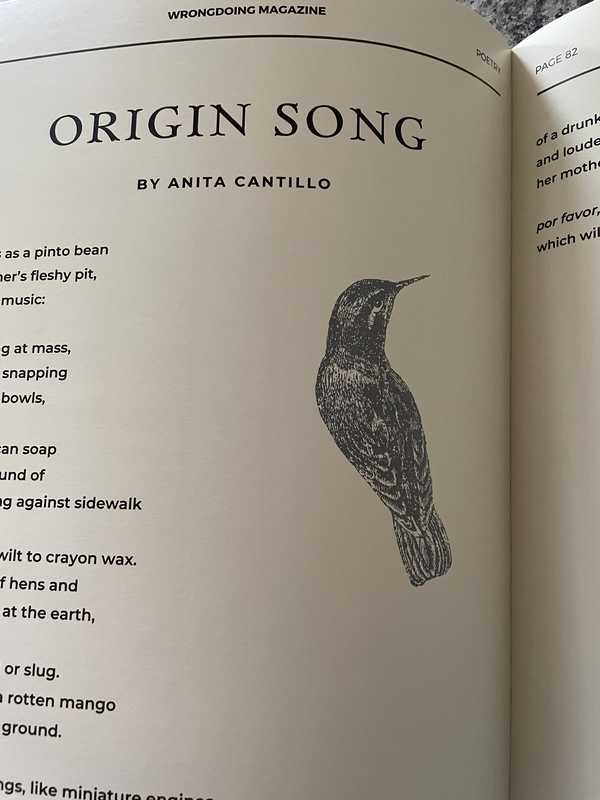
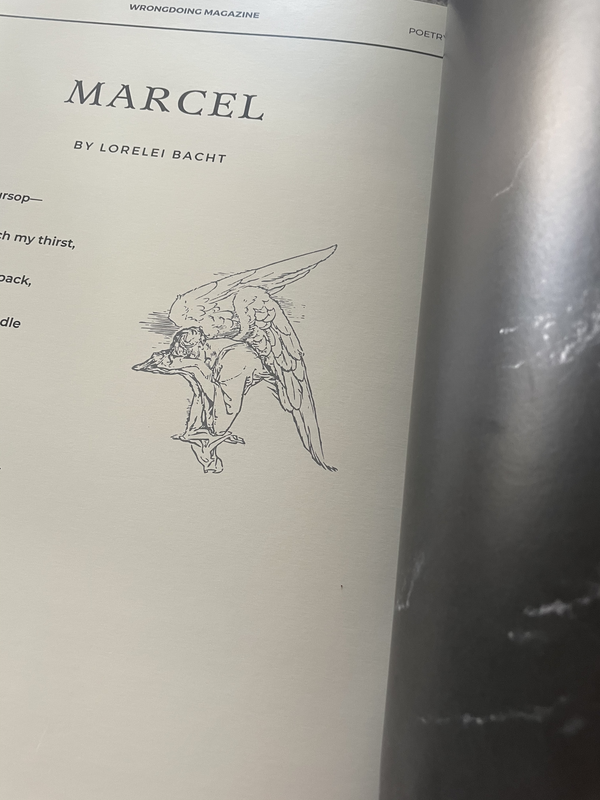
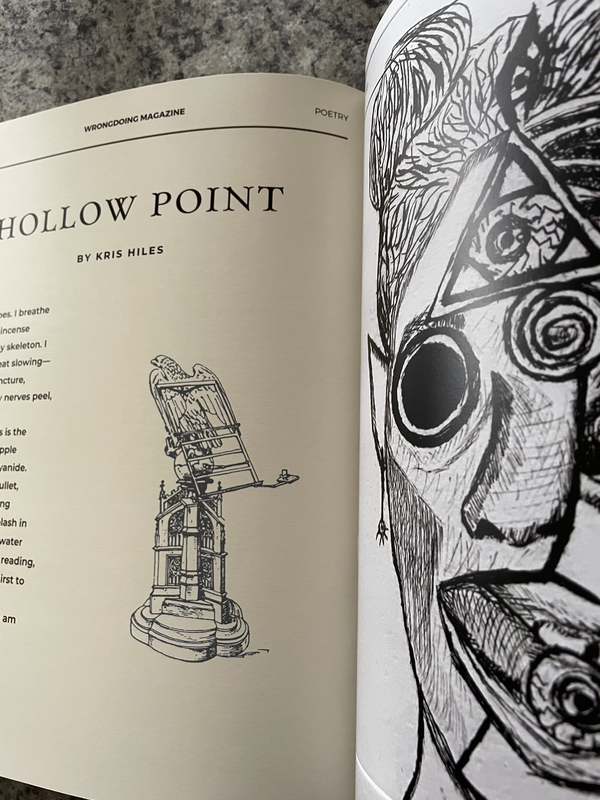
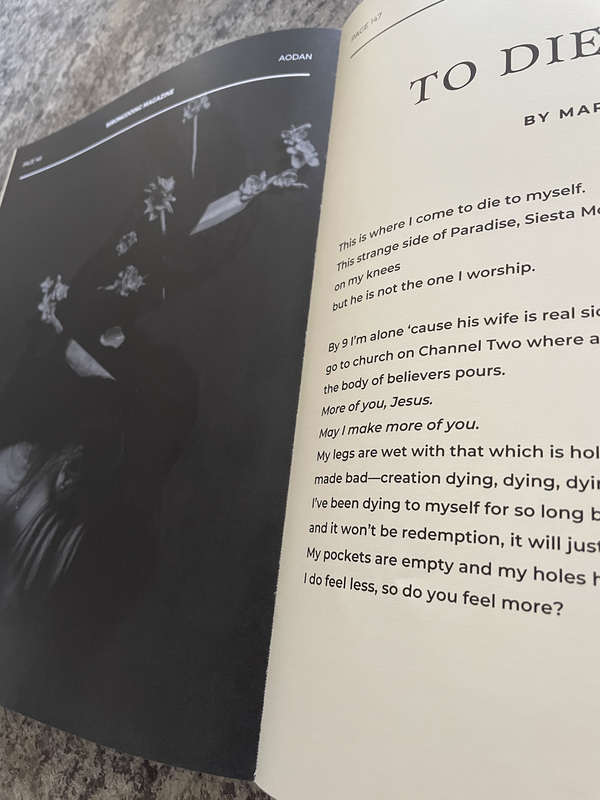
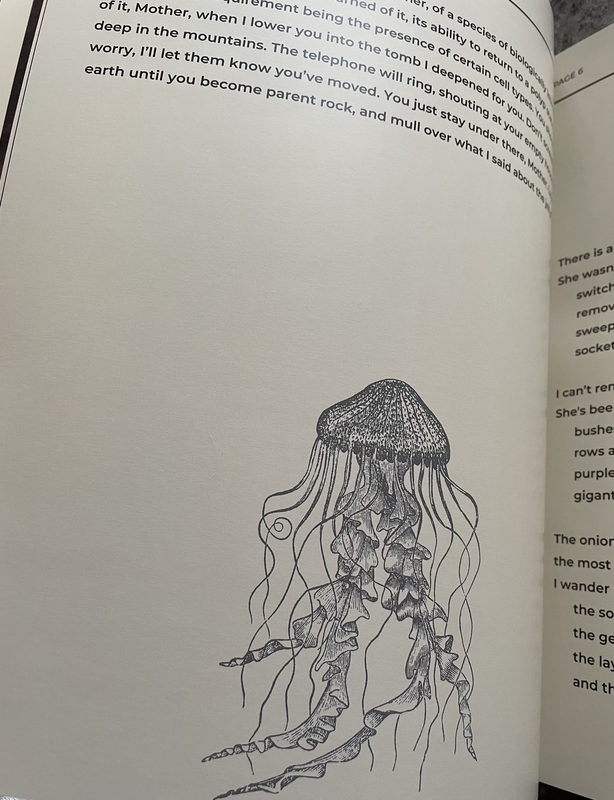
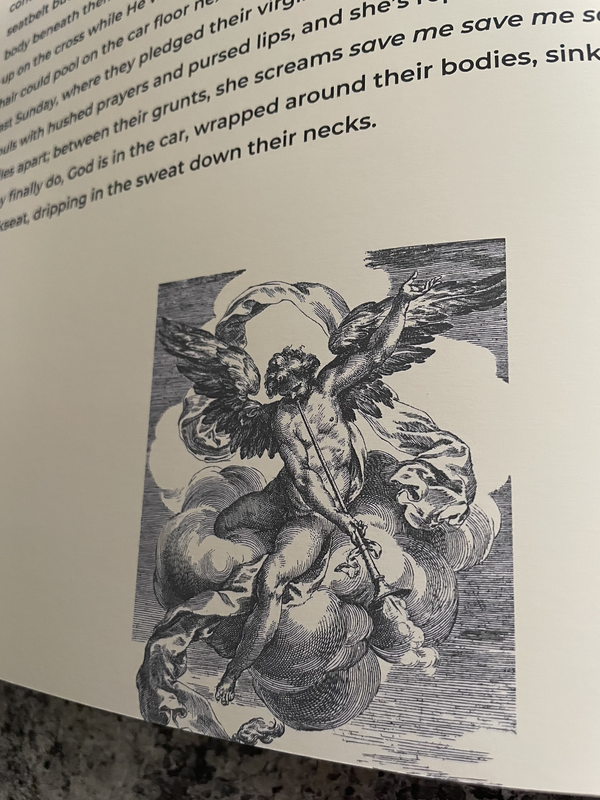
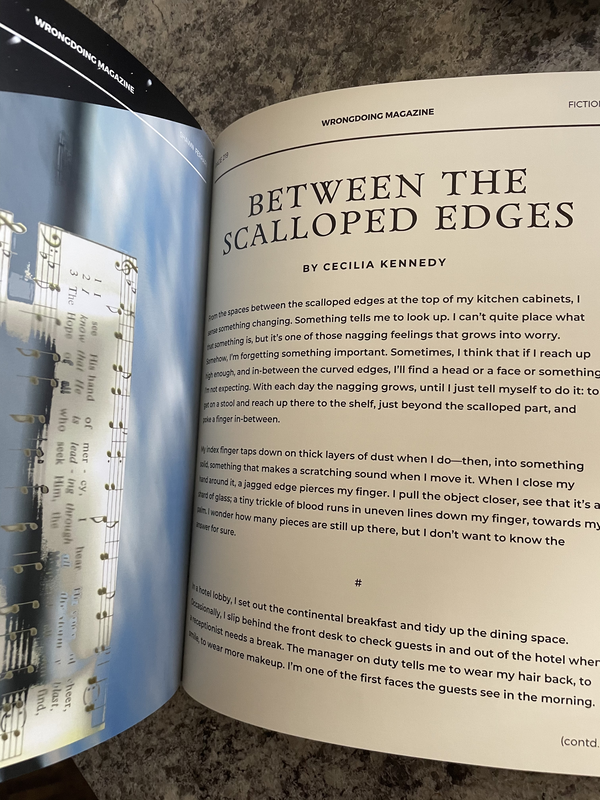
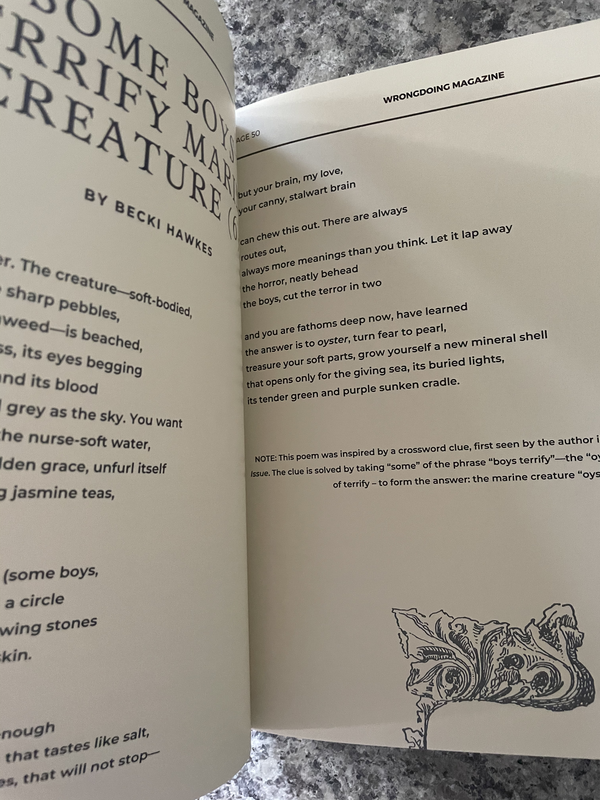
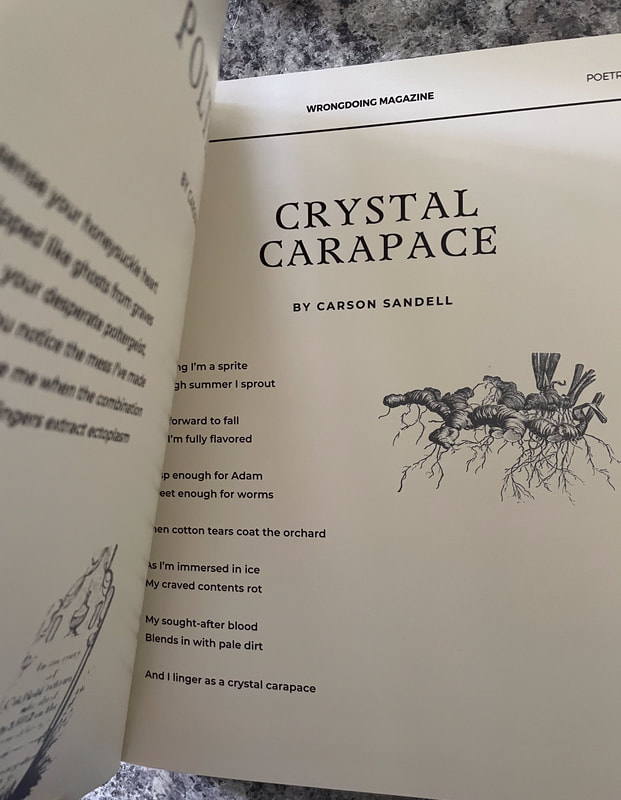
 RSS Feed
RSS Feed
